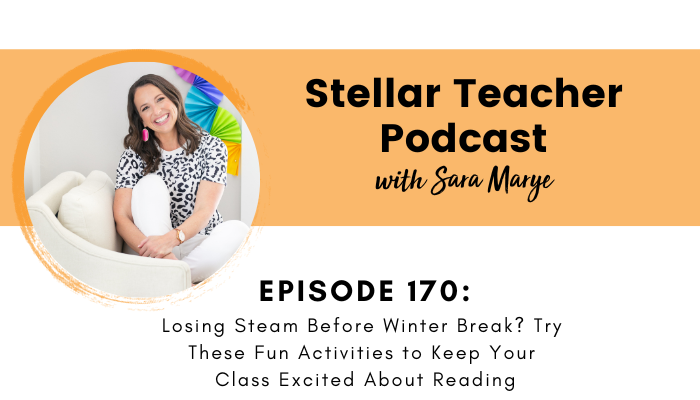
Click play below to hear ideas to keep students reading until winter break:
The weeks between Thanksgiving and winter break can be long and exhausting for both students and teachers. But if you can begin incorporating some fun reading activities, your students will be engaged and motivated during independent reading time up until winter break. To get your students interested and engaged in reading until winter break, I’m sharing five ideas that you can use in your classroom starting today.
During these several weeks, you have an opportunity to reignite a spark for reading in your students. The five ideas I share allow for student choice, exploration of new genres and authors, and incorporating more holiday or seasonal texts during read-alouds or independent work time. Another added bonus to these ideas? Each one requires very little or no prep at all!
Keeping students engaged and motivated to read on a regular day can be difficult, let alone when they know a big break is coming up soon. But by incorporating these fun and captivating activities, you are guaranteed to have your kids wanting to keep reading until winter break or even through the break.
In this episode on keeping students reading until winter break, I share:
- 5 ideas to keep students engaged and reading until winter break
- Ways to introduce different authors and genres during this time
- Why giving students a choice ignites fun in reading again for students
- Proof that these ideas require little to no prep
Resources:
- Reading Comprehension Passages and Activities – Holiday Bundles
- Sign up for my Private Podcast: Confident Writer Systems Series
- Check out the Stellar Literacy Collective Membership
- If you’re enjoying this podcast, please leave a review on Apple Podcasts!
Related episodes and blog posts:
- Episode 133, Keep Your Students Engaged in Reading Until the Very Last Day of School: 7 Tips for You!
- Episode 12, Build Literacy Buzz with Book Talks
- Episode 9, Getting Started with Author Studies
- Establishing Student Independence During Book Clubs
- Getting Started with Author Studies
- 10 Easy Ways to Make Reading Fun and Engaging for Students
- Boost Reading Engagement with Book Talks
Connect with me:
- Join my newsletter
- Shop my TPT store here
- Instagram: @thestellarteachercompany
- Facebook: The Stellar Teacher Company
More About Stellar Teacher Podcast:
Welcome to the Stellar Teacher Podcast! We believe teaching literacy is a skill. It takes a lot of time, practice, and effort to be good at it. This podcast will show you how to level up your literacy instruction and make a massive impact with your students, all while having a little fun!
Your host, Sara Marye, is a literacy specialist passionate about helping elementary teachers around the world pass on their love of reading to their students. She has over a decade of experience working as a classroom teacher and school administrator. Sara has made it her mission to create high-quality no-fluff resources and lesson ideas that are both meaningful and engaging for young readers.
Each week, Sara and her guests will share their knowledge, tips, and tricks so that you can feel confident in your ability to transform your students into life-long readers.
Tune in on your favorite podcast platform: Apple, Google, Amazon, Spotify, Castbox, and more! If you’re loving this podcast, please rate, review, and follow!
Podcast (stellar-teacher-podcast): Play in new window | Download
Happy Monday, friends, and welcome back to another episode of the podcast.
Today, I wanted to share some ideas with you on how you can keep your students engaged and excited about reading up until winter break and even through the holiday break.
I know and I remember, like how hard this time of year can be. And I think this year, there are just three weeks but the time between Thanksgiving and Christmas can feel like an eternity, it can be so hard to keep kids on task to keep their behavior in check to keep them excited and motivated and focused on anything school related.
And let’s be honest, it can be also really hard as a teacher to be excited and engaged and motivated to want to teach. And knowing how challenging this time of year can be. I think it is really important for us as instructional leaders in our classrooms that you know, we need to be intentional about planning reading activities that are going to be fun and engaging not only for our students, but we need to plan things that are going to be fun for ourselves, we need to plan things that are going to bring us joy.
And so if you are feeling a little bit of dread about teaching these next few weeks, I wanted to share some ideas that might make reading just a little bit more fun for you and your students. And all of these ideas, honestly, they don’t require a ton of prep on your part. If you are listening to this episode on your way to work, you could probably start incorporating some of these ideas today in your classroom with very little prep.
Let’s jump into the idea. So the first thing that you could do if you are wanting to just sort of increase engagement and motivation is incorporate a reading challenge. And there are a ton of different types of reading challenges that you can give your students.
And really all a reading challenge is is just one way that you can gamify your reading instruction, you know, your 40 minutes or 30 minutes of independent reading that your students do every single day might feel a little bit boring to them and monotonous. But if all of the sudden you introduce a reading challenge that can turn into a fun and exciting event.
Some of the reading challenges that you could do, like I said, there’s a ton of different ideas, you could do a genre challenge where during the month of December, they try to read a different genre every single day, you could do an ABC challenge where they have to come up with either a book title, an author or a reading task for every single letter of the alphabet. And they try to complete that challenge by the end of December.
You could do a picture book challenge where they have to read a picture book every single day, this could be especially good if your students are used to reading chapter books, this would give them something completely different to read. Or you could even just do you know 30 minutes a day or whatever it is, you could let your students come up with their own challenge, you know, you could let every student in your class come up with a task for the challenge. And then everybody has to complete that.
So there are tons of different ways that you could do reading challenges, you could do one challenge for the next three weeks leading up to the breaks. Or you could do a different challenge each week to keep your reading block fun and interesting, especially if your students know that every week there’s going to be a new challenge that might be something for them to look forward to on Mondays.
And honestly, there really isn’t a lot of prep work that goes into it, you just kind of need to think about what the challenge is what the terms are, keep it simple. You know, the goal of the challenge is that every student can experience success and have fun with it. So it doesn’t need to be complex.
You know, you want to come up with something that your students can track their progress with, it could be as simple as a post it note, a reading journal, a reading log, or you can have some sort of like bulletin board display. And you want to think about having some small celebration at the end of the challenge and it could be just a cheer, it could be a certificate, it could be a sticker, it doesn’t need to be big and elaborate.
Because again, the goal is kind of the process, but it’s just something a little bit different and I do have a set of reading challenges that would make this super easy for you they are included in my reading membership and in the TPT store. So I’m gonna go ahead and link to those in the show notes. And so like I said, if you want kind of like the ready to print and hand to your students challenges, I have that done for you, but you could come up with your own terms and your own tracking system. And like I said it could be as simple as like a post it note.
Now if you’re like oh I love this idea and if you want to get a little bit fancy with it, you could easily create like a leaderboard or a display that shows which kids are leading the challenge or you could even make this challenge a whole class incentive, and the entire class could work on the challenge. And so every time a student contributes, it benefits the entire class. And you could come up with some sort of class tracker.
But honestly, all of this extra stuff isn’t necessary. Just giving the kids a reading challenge can be enough to boost the engagement. And the whole sort of like purpose behind it is a reading challenge is going to break up the monotony of your regular independent reading. And it might be just the ticket that your students need to put a little bit more spark into their reading. So reading challenge is a great way to boost engagement.
Okay, another idea you could do is to do a holiday themed book talk or a seasonal themed book talk during the month of December. And if you haven’t already started doing book talks in your classroom this year, December really would be a great time to start, it’s a good time to introduce a new routine, and practice something because then when your students come back from January, it is something that they can refine and you know, you can do book talks for the rest of the year then.
And a book talk is basically a commercial a student gives for a book that they have read or are currently reading. If this idea of a book talk is new to you, I did an entire podcast episode on book talks back in episode 12. So if you’ve never heard of book talks or need a refresher, go check out that episode.
But during the month of December, you could put a special twist on the book talks, and you could have your students give a holiday or seasonal themed book talk. And a couple of things that you could do is one, you could either let students share their favorite holiday book from home or growing up a story that is important to them and their family during this time of year. And they could do a book talk that shares the significance of that book. And maybe if it talks about how their family specifically celebrates holidays.
Or you could also have your students find a book that either shares a story, or talks about a cultural or religious holiday that is different from their own. And it would almost be like a little research project. And they could give a book talk on that book and share what they learned. And so this could be a great way for students to learn and share about holidays and traditions that are important in other parts of the world.
And so December might be a good time to give your students you know, a little extra, so even if you are doing book talks, like maybe give your students a little extra time to create a special artifact or do an art project or something extra for their book talk again, we want to do something that might be a little more engaging and a little more exciting. And to make the book talks a little special.
You know, they might be able to create a brochure or a poster, or put together a craft or an art project that represents the book or what they learned. And then they could, you know, present that to the students. So a holiday or seasonal theme book talk could be a really fun way just to break up the monotony of independent reading, or how you typically have students respond with a book talk, students are definitely still focused on reading and sharing their reading experience. But in this case, there’s a little holiday twist to it.
An alternative idea that you could do is rather than having your students do the book talk in the next three weeks leading up to the holiday break. A book talk could be your student’s assignment during the holiday break. And I know some teachers are required to send home like a work packet or assignments for students to do over the two week break. If possible, I would say avoid that I like to give students actual time off.
But if you have to send something home, a book talk might actually be a really good assignment because students would have to read they would have to respond. But it also just seems like a little bit more fun. You know, you can have them record a video of their book talk, you can have them do a couple of different like fun projects with it. So again, a book talk could be a good assignment over the holiday break. But it could also be something fun that you incorporate into your reading block leading up to the holiday break.
And if you’d like the idea of incorporating book talks, but you don’t want to go through and prepare more materials, I have both a book talk freebie that I will link to and a book talk resource that I will link to and the resource is both in the reading membership and the TPT store just for those of you who are looking for a little extra help.
But again, you can do book talks, whether you have a resource for it or not. Because it simply is letting your students give a commercial and talk about the books that they are reading.
I would encourage you that if you’ve never done them, and you don’t want to buy a resource grab the book talk freebie that I am going to link to in the show notes because it has a set of anchor charts that if you’re new to book talks, it helps you communicate the expectations that will just make your book talks run a little bit smoother in your classroom. So book talks are great both for your reading block leading up to winter break and an assignment over winter break.
Okay, another idea that I have is you could do an author study. Now you could do one author study over the next three weeks. So you pick an author and you intentionally read multiple books by that same author over the next three weeks. Or if you really liked the idea of an author study. You could do three different author studies and each week you study a different author.
And again, if you’ve never done an author study, I also did a podcast episode on this and so go back and listen to episode number nine where I dig a little bit deeper. But an author study is actually really straightforward. It is as simple as pick an author, find books written by that author, and then read the books to your students.
And the goal is for you to identify similarities in the books and the themes and the characters and the storylines and the topics and just notice, what is the style of that author, you know, what is the goal sort of, of not just the book, but their entire body of work?
And, you know, you start to ask questions about what inspired the author and why do you think they wrote this book? And what was their purpose for the books? And why did they keep writing? And you know, what do we notice about characters that show up in multiple books? And so it’s just a chance to intentionally dig deep into a specific author and their type of books.
And so, like I said, you could pick one author and study their books for the next three weeks, or you could do three different authors, some of my favorite authors to do author studies on in upper elementary. Patricia Polacco is a great author for upper elementary, she has such good, rich storylines that I think are so fun for students to you know, they really can relate to some of just like the themes and the characters.
She is the author of thunder cake, Mr. Lincoln’s way, my rotten, redheaded, older brother, chicken Sunday, and many, many others. She’s got a ton of books, she’d be a great one for the entire month of December.
Other authors that are great are Jacqueline Woodson, she is the author of each kindness, the day you begin, this is the rope. If you haven’t read those books, definitely check her out.
Jory John is another really fun author. He’s the author of all of the books that are in the series, the good egg, the bad seeds, the cool bean, he’s got a bunch of them. So if you’re looking kind of for some ideas, those right there are three authors that you could study during the month of December.
But really, you can pick any author that you or your students enjoy. You know, and like I said, an author study is really simply reading books by the same author. And maybe you’re thinking, well, Great, that sounds awesome. But how am I going to get these books?
First of all, go check out your school library, see if they happen to have multiple books written by the same author, if you happen to have a public library, close by stop by the public library, that is great.
But the other thing is, is thanks to the internet, I feel like YouTube literally has every single book being read aloud by somebody. And so rather than reading the books to your students, you could find the YouTube videos of somebody else reading the books. And that would then also just make your read aloud time a little more fun and special. Because now not only are you doing an author study, but you’re also watching the video of these books rather than just reading them to them.
So there’s definitely ways that you can get the books for free and quickly if you think that this is a great idea, but feel like you don’t have a lot of time to plan. Author studies are great because it’s like not only is this the anchor for what you’re doing in reading, but you can also connect it to other other subject areas or projects.
So if you’re doing an author study, you could also at the same time work on doing some letter writing and you can write a letter to the author after you’ve read the books, you know, thanking them for the stories telling them which one your favorite is asking them questions.
You could also be intentional about doing an art project with your students that mirrors the style of the illustrator for the books that you are reading, that is one of my favorite things that I did. Anytime I would do an author study, I would also try to do an illustrator study and learn, you know, the type of artwork that the illustrators do and try to, you know, let my students create an illustration that is similar.
You know, you could even have students write their own version, or their own story that they feel like would fit into the author’s collection. So if you did a study with Jory John, students could write their own good egg or cool beans story and try to personify some sort of object and have that object to be a character that learns lessons and you know, things like that.
So there’s definitely ways that you could take your author study into other subject areas as well and kind of have it be an anchor for all of your literacy instruction for the entire month of December.
And sort of the theme and the goal of all of these ideas I’m sharing is that it is something that is slightly different than what you usually do during reading. So obviously, you’re going to do read alouds, with your students, you’re going to talk about the books and the authors. But by doing an author study, specifically, it’s going to be enough of a difference that it might sort of spark an interest or get your students re engaged and excited about what it is that they are reading.
And again, if you want to think about how you could use an author study, as part of like your homework over the winter break is you could let your students pick an author to study as their homework, or you could assign an author for the entire class, and have your students study that author, you know, on their own, and then when they come back, you can share what they learned.
So if students don’t have access to the books, if you use a program like epic or another online platform for reading, you could see if there’s an author in there that has multiple texts, or you could even just send home the YouTube links and students can watch the videos of the books written by the author and letting students do an independent author study might just be a fun way to spice up their independent reading over the break.
And it could be optional. You know, that could be something that I know even if your school doesn’t send home homework. Sometimes parents ask how can I keep my students reading or working over the break so you could send home an optional author study for students to do.
Okay, my fourth idea is to be intentional about incorporating more holiday or seasonal texts into your reading block, whether that is through your read aloud through your book clubs through your small group instruction, or even just having holiday and seasonal books available for students to read during independent reading time.
And, again, this is similar to the idea of a holiday or seasonal specific book talk. But just being intentional about what time of year is it what is happening both with holidays, and seasons and weather. And leaning into that and letting students you know, learn more about those things, because it is relevant to what is happening.
So you could select a holiday or seasonal themed chapter book to read during the month of December, you could incorporate more holiday or seasonal picture books into your read alouds. You know, you could even just find reading passages or homework for independent practice that are connected to the holidays or the seasons.
And during this time of year, you can dig into and learn about all of the religious and cultural holidays that are celebrated this time of year. And I think it’s important that if you choose to, you know, read books that are specific to Christmas that you also then learn about other holidays that might not be celebrated in our country or even this time of year so that way all students can feel represented.
And even if all of the students in your class do celebrate Christmas, I still think there is value in teaching our students about holidays that are different from the ones that we celebrate.
But I know not every school is big on making the holidays, a focus. And so if you are at a school that doesn’t really celebrate the holidays, or tries to minimize holidays, there are still so many interesting topics that are related to the winter season that you could explore with your students this time of year.
You know, we’re about to celebrate the winter solstice, which is my least favorite day of the year. But again, it’s kind of interesting, just this idea of like, a shorter day of the year. And why is there more darkness in the winter than in the summertime? That’d be a great way to explore and bring in some science.
You could have your students dig into and learn about the legend of the Abominable Snowman, otherwise known as the Yeti. And what is the myth behind that also a great way to explore another genre.
You know, you can have your students learn about the history of the Winter Olympics, or the different sports we’re about to celebrate the Winter Olympics, I think in February. And so that would be another relevant topic, or even just learning about winter sports in general. And having students explore that or have them study winter patterns that are in all parts of the world.
You know, I live in Florida right now, and we have absolutely no snow. I grew up in Minnesota, obviously. And so in my mind growing up, every part of the world had snow in January, because that was my reality. And so think about what is the weather, like where your students live? And could you find some texts that help them understand that the weather is maybe not the same in all parts of the world this time of year.
So there’s definitely winter topics that you could explore, that aren’t even connected to any of the holidays at all. So think about maybe just making a seasonal focus.
And, of course, you guys know that I love trying to bring in a variety of genres anytime I can. And so one of the things that you could do, which is why I mentioned the idea of the legend of the Yeti, is because you could also try to think about how can you incorporate other genres into the study of winter topics as well.
And one of the things that we have that I’ve put together in my TPT store, and in the reading membership is a set of genre specific winter passages. And in this set, there are six passages and each one is written in a different genre. And I think in the winters that we have an informational one, we have a fantasy, we have a myth, we have a realistic fiction biography and one other one that I cannot remember.
But this will be a super easy way just to like change up or spice up your students homework or their independent reading, or even use these for your small group lessons. Because it’s just something a little bit different. And it’s relevant to the season that we are currently experiencing.
And you could also use the set of like winter passages or any set of winter passages I know there’s tons of them available on TPT, or even all over the internet. So just find something that’s, you know, winter related and seasonal. And that could be your students homework option during the two weeks off, or you could let them pick, you know, what three genres do they want to read about, and send home the passages for that.
So definitely ways that you can take advantage of the holidays and the seasons that we are currently celebrating and bring those into your reading instruction. Because, again, we typically don’t study winter in June or in May. And so you might as well take advantage of the fact that this is this season is something that students might be interested or experiencing, and try to find some of those interesting topics like I mentioned, like the winter solstice, or the Winter Olympics or something like that in learn about those and read about those. So holiday or seasonal themed reading.
And now my last tip, tip number five, or the fifth thing that you could do is incorporate a student choice book club and book clubs are always a fun way to boost engagement. And so if you currently have book clubs running in your classroom, one thing that you might want to do during the month of December is pause your current book club, and let students form their own student led and students selected book club.
And this can be done in a variety of ways you could let your students select a short chapter book that they’re going to study over the next three weeks, but again, students selected as important here, or you could just pick one week where you know, maybe next week you’re going to have students selected book clubs going on. And your students could pick a picture book to study for their book club.
And the whole point, though, of a student choice book club is that everything is selected by the students, which means you’re going to let your students form their groups. Maybe that means you have just two students studying a book together. Or maybe that means you have a group of seven girls who are all best friends, and they want to study a book together. And maybe your book clubs typically aren’t seven. But during this week, during the student choice book clubs you’re gonna let them all form their group.
You’re gonna let your students pick their book, no matter if it is an easy book, a hard book, a chapter book, a picture, book, something that they’ve already read before, and you’re gonna let them pick their own rules, and you’re gonna let them pick their assignments, and you’re gonna let them pick their schedule, obviously, within the timeframe that you give them.
I think it’s important for us to step back and just remind ourselves that reading is meant to be fun. And even when we as teachers regularly incorporate things like book clubs and book talks on a regular basis, if we as the teachers are always the ones that are assigning them these things, even while they can be fun and are meant to be fun, they can still feel like an assignment.
And so sometimes it’s good just to take a step back and say, You know what, you guys have free choice, you’re still going to do a book club, but you get to choose, anytime we can give our students choice, they’re just going to get more excited and pumped up about what it is that they get to do.
So we got three weeks here, let your students have free choice book clubs for the next three weeks, it would maybe be like 20 minutes out of your day, or 20 minutes, a couple days during the week, or even just pick one week where your students have a book club.
And if you wanted to incorporate book clubs as part of your homework, of course, this is completely optional. But you could have an optional virtual book club where you could tell your students during the week that they are off on vacation, if they want to log into zoom or Google classroom or whatever it is, and discuss a book just for the fun of it. That’s an option that might be a little bit more work for you, your students.
But again, I think it’s just this idea of let book clubs be fun during December. And one of the ways that you can do that is to give them choice and just take a little bit of a step back on some of those requirements that you typically do.
So hopefully, you are feeling a little more inspired and excited and just pumped up about teaching reading these next three weeks, I know that these three weeks can feel daunting and overwhelming. And you are just like, you have worked so hard this year, and you and your students are ready for December 20, or whatever the date is that you are on a two week vacation.
But let me just remind you that you can have a lot of fun during these next three weeks. And it doesn’t need to require a lot of extra work on your part. So let me just remind you and run through the five ideas that I shared that can bring just a little more joy and excitement to your reading block.
And those are reading challenges, holiday themed book talks, doing an author study or multiple author studies, doing a holiday themed or incorporating more holiday or seasonal themed texts or passages, and then letting your students have free choice for the clubs.
And the goal with all of these ideas is just to break up the monotony, change things up enough to where students are excited and engaged and motivated, you know, to want to keep reading up until and possibly through winter break. And so hopefully some of these ideas are helpful.
You guys know I love hearing from you. So if you think you’re gonna incorporate some of these ideas into your classroom, I would love to hear from you. Reach out to me at @thestellarteachercompany on Instagram and just let me know what you plan on incorporating.
I hope that you and your students enjoy reading these next three weeks. I am wishing you the best absolute week ever. And I will see you back here next Monday.

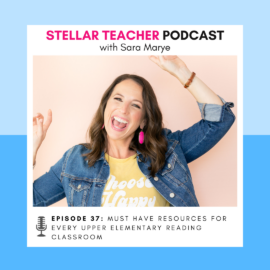
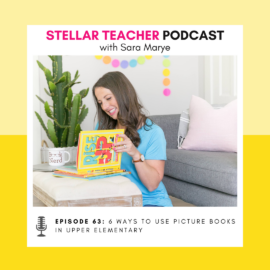
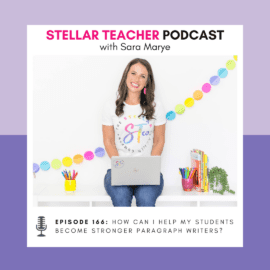
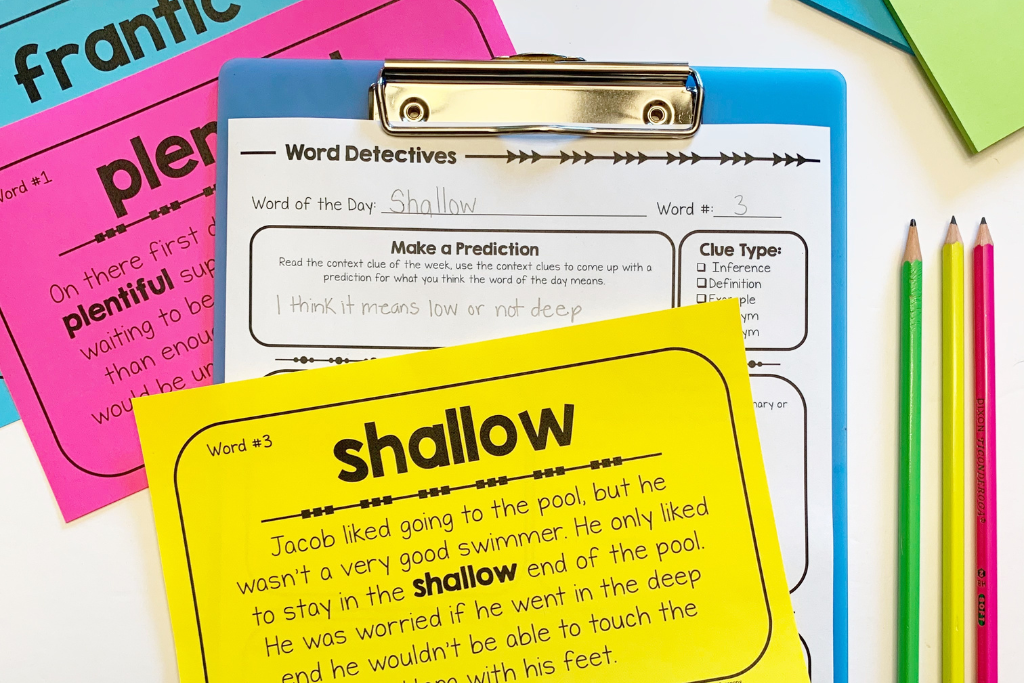

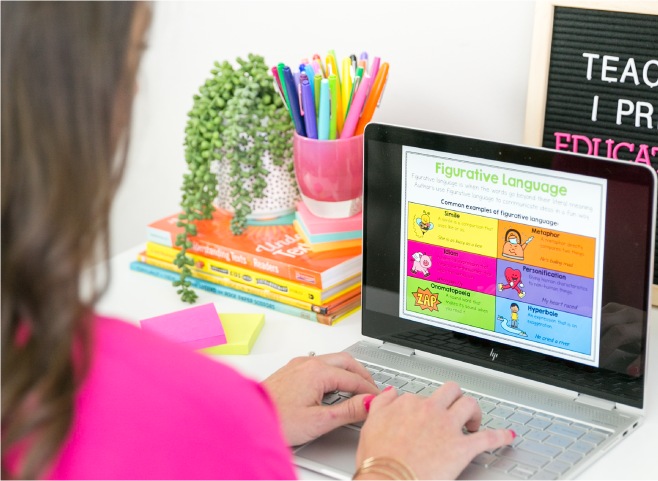
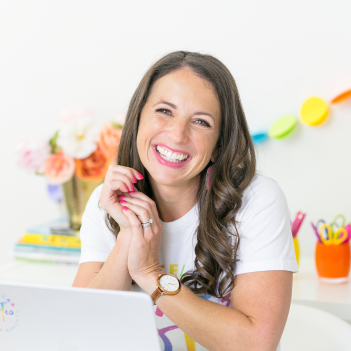
Leave a Comment
You must be logged in to post a comment.